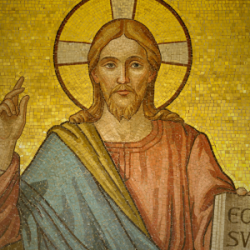Welcome readers! Please subscribe through the buttons on the right if you enjoy this post.

In both Matthew’s and Luke’s gospel we read this teaching of Jesus:
“Come to terms quickly with your accuser while you are on the way to court with him, or your accuser may hand you over to the judge, and the judge to the guard, and you will be thrown into prison. Truly I tell you, you will never get out until you have paid the last penny.” (Matthew 5:25-26)
“Thus, when you go with your accuser before a magistrate, on the way make an effort to settle the case, or you may be dragged before the judge, and the judge hand you over to the officer, and the officer throw you in prison. I tell you, you will never get out until you have paid the very last penny.” (Luke 12:58-59)
The Intended Audience
The social location of the first audience of this saying impacts its meaning. I believe the audience Jesus was speaking to in this discourse was in the more affluent segment of his society. Matthew compiles this saying with the collection of Jesus’ sayings that today we call the Sermon on the Mount. If all we had was Matthew’s compilation, we could wrongly conclude that this week’s saying was intended for a universal audience. Fortunately, Luke is more specific and tells us the social location of the audience Jesus aimed this teaching at.
“Someone in the crowd said to him, ‘Teacher, tell my brother to divide the inheritance with me.’ Jesus replied, ‘Man, who appointed me a judge or an arbiter between you?’” (Luke 12:13,14)
Arguments over inheritances aren’t common among the poor or lower-middle classes. These are problems that exist among the affluent. Jesus did not see himself as called to mediate between competing factions of the affluent. Instead, he had emerged among his Jewish poor peers as a prophet of the oppressed and liberator of the poor (Luke 4).
“And he told them this parable: ‘The ground of a certain rich man yielded an abundant harvest.’” (Luke 12:16, emphasis added)
Jesus then tells this affluent audience the parable of a rich man, someone like themselves. To that man he says,
“Sell your possessions and give to the poor.” (Luke 12:33)
Jesus sums up this parable with the call for you, the affluent, to sell your possessions and give them to the poor. Jesus’ audience here is not the poor. He isn’t calling the poor to share their resources as a means to survive. He’s instead speaking to the affluent and calling for radical wealth redistribution. Just as in God’s world the sun and rain belong to all alike, so too we must abandon the systems we’ve created where some have much more than they could ever use and others’ needs are going without being met.
Jesus called his society’s affluent to wealth redistribution. He tried to avert the political and economic crisis he saw on the horizon from the masses becoming more exploited. A breaking point was approaching, and these passages in Matthew and Luke continue that appeal to his affluent listeners:
“While you go along with your opponent [the poor] on the way, make an effort to get loose from him, lest the opponent hand you over to the judge, and the judge to the assistant, and the assistant throw you into prison. I say to you: You will not get out of there until you pay the last penny.”
It could have been highly offensive to threaten someone from the upper sectors of first-century Jewish social class with being thrown into debtors prison. But as is often the case in the gospels, Jesus is not speaking literally but in parable form.
What we know from history now is that the poor did finally revolt. The exploited poor of Jesus’ day did violently rise up against the elites in Jerusalem, and they went on to take up arms and revolt against Rome itself as well. The Roman backlash was merciless and Jerusalem was laid waste. If Jesus saw this coming, I can understand his trying to warn them. The uprising of the poor would end up implicating even the wealthy elites (“your opponent would hand you over to the judge”). And they did end up losing everything down to “the last penny.” Jerusalem was left a barren waste, everything lost, for everyone.
Social Location Matters
The social location of these passages’ intended audience matters. Let me briefly share three examples.
The message of self-denial is heard very differently by those at the bottom and edges of society than from those whom society is shaped to benefit. While those at the top need to hear a message that involves self-denial, those at the bottom of society are already experiencing oppressors deny them their selves.
The message those at the bottom of society need is one of self-affirmation, not self-denial. Their need is imaginative ways to affirm their self in a world where their self is already being denied by those pushing them to the underside or edges of their world. They need a message that affirms their standing up for themselves, not a message that denies their selves. Such would only leave them passive and the systemic injustice unchallenged and thus unchanged. Telling the self-denied to deny themselves even further makes for quite a convenient gospel for White oppressors.
The same is equally true of a gospel defined only as self-sacrifice. I believe in restoring people’s true selves, not sacrificing them. Consider for a moment how the Gospel and Jesus have been reduced to a message of self-sacrifice. When we define being like Jesus to be simply self-sacrifice, we do untold damage to victims of abuse. Consider domestic violence for a moment. A survivor of domestic violence has been told at some point that they are worthy, they are valuable, that they are worth standing up for and saying no to their oppressor. Too often well-meaning Christians have, through a message of “Christlike” self-sacrifice, left spouses abandoned in violent situations only to endure in the hopes of saving their victimizer. This has often had very lethal results.
Elizabeth Bettenhausen writes:
“Christian theology has long imposed upon women a norm of imitative self-sacrifice based on the crucifixion of Jesus of Nazareth. Powerlessness is equated with faithfulness. When the cross is also interpreted as the salvific work of an all-powerful paternal deity, women’s well being is as secure as that of a child cowering before an abusive father.” (Christianity, Patriarchy and Abuse, p. xii; edited by Joanne Carlson Brown & Carole R. Bohn)
Brown and Parker in their essay, “For God So Loved the World?” write:
“The central image of Christ on the cross as the savior of the world communicates the message that suffering is redemptive . . . The problem with this theology is that it asks people to suffer for the sake of helping evildoers see their evil ways. It puts concern for the evildoers ahead of concern for the victim of evil. It makes victims the servants of the evildoers’ salvation.” (Ibid., p. 20.)
Social location matters. Listening to how certain theologies impact those on the undersides or edges of our society matters. These are perspectives and concerns that must be heard.
Lastly is the subject of self-care for those whom society either wants to extinguish from existence (Chechnya wants to eliminate gay community by end of May, reports suggest) or for those in society who still deny they even exist at all. (Examples would be those who deny that being transgender exists. In 2012 the APA gave a shot of hope to the transgender community by revising its material stating that being transgender was no longer a mental disorder.) Self-care is vitally important for communities of color (for both men and especially women) when these are communities find themselves within larger communities where the “justice system” of the status quo daily threatens their existence.
As Audre Lorde stated, “Caring for myself is not self-indulgence, its self-preservation, and that is an act of political warfare.”
In an organizational way, alongside those who are thankful for Renewed Heart Ministers, there are also those folks who wish Renewed Heart Ministries also did not exist or could be silenced or shut out, as well. Existence matters, both personally and organizationally as we move toward transforming our world into a safe place for all of us.
In his saying, though, Jesus was not telling the oppressed, marginalized, or the subjugated that they need to make peace with their oppressors before it’s too late. He was not preaching reconciliation without concrete changes in an exploitative society. As Jacqueline Grant rightly states, “the language of partnership is merely a rewording of the language of ‘reconciliation,’ which proves to be empty rhetoric unless it is preceded by liberation.” (White Women’s Christ and Black Women’s Jesus, p. 191)
Jesus was not preaching passive reconciliation and forgiveness of those at the helm of an unjust system. On the contrary, Jesus invited those at the top, whom the oppressed were calling to change, to stop fighting those changes and instead make reparations.
Paying the Last Penny
What loomed on the people’s horizon was not that the poor were finally able to take back what had been taken from them. No, poor and the rich alike were annihilated by Rome in 70 C.E. Threats of impending doom didn’t motivate those who belonged to the dominating sectors of the society to change. And it doesn’t seem to be doing so today either.
What I can attest, is that compassion, seeing my interconnectedness with others, stopping to listen to what the experience of this life is like for those on the undersides and edges of our world today does motivate me to lean into the social teachings of Jesus and actively engage in a relationship with others. Just like in 70 C.E. We are all in this together. The choices we are making today will affect us all to varying degrees. We all inescapably share our world with each other. We are each other’s neighbors. And thus we must learn to love our neighbor as ourselves.
We are not as disconnected from our neighbors as we are taught to believe. What does it mean to come to terms with those who are being oppressed and marginalized in our society before we are placed in a scenario where we all pay the last penny?
It means we have the choice of whether or not to share this space in a way that makes sure everyone is taken care of. To make sure there is enough for everyone. Where no one has too much and no one has too little.
The call to distributive justice mimics Jesus’ sunshine and indiscriminate rain, and later invites the decision to ensure each one possesses “their daily bread.”
The choice is stark.
Enough for everyone, or nothing for anyone.
We are in this together. We are each other’s keeper.














